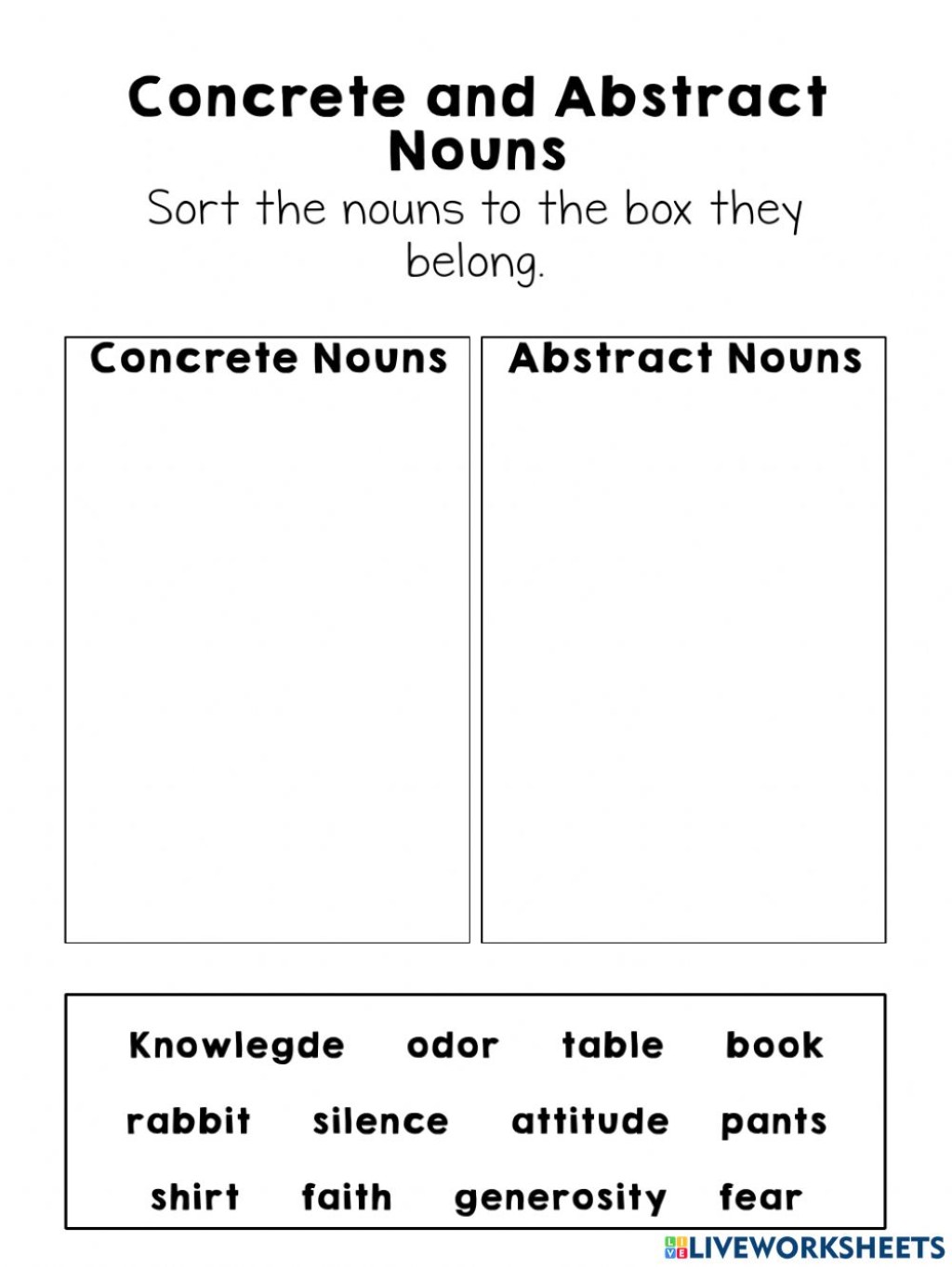Master The Art Of Noun Usage With Engaging Concrete And Abstract Nouns Worksheets! Embrace The Power Of Click To Action (CTA) Now!
Concrete and Abstract Nouns Worksheets: Enhancing Language Skills
Greetings, Smart Readers! In today’s article, we will delve into the fascinating world of concrete and abstract nouns worksheets. As language enthusiasts, it is crucial to understand the difference between these two types of nouns, as they form the backbone of our communication. By mastering the usage of concrete and abstract nouns, you can elevate your writing and speaking skills to new heights. So, let’s dive in and explore these worksheets that will undoubtedly enhance your language abilities.
Overview of Concrete and Abstract Nouns Worksheets
Concrete and abstract nouns are the building blocks of language. Concrete nouns refer to tangible objects, things, or people that we can perceive through our senses. On the other hand, abstract nouns represent ideas, concepts, or emotions that are intangible and cannot be physically experienced. These worksheets provide a comprehensive approach to mastering the usage of both types of nouns, allowing learners to develop a strong foundation in language skills.
2 Picture Gallery: Master The Art Of Noun Usage With Engaging Concrete And Abstract Nouns Worksheets! Embrace The Power Of Click To Action (CTA) Now!


1. What are Concrete and Abstract Nouns?
📚 Concrete Nouns:

Image Source: liveworksheets.com
Concrete nouns are nouns that can be perceived through our senses. They include objects, places, animals, or people that have a physical existence. Examples of concrete nouns include table, mountain, cat, and teacher. These nouns can be seen, touched, smelled, heard, or tasted.
📚 Abstract Nouns:
Abstract nouns, on the other hand, represent ideas, concepts, qualities, or emotions. They are intangible and cannot be experienced through our senses. Examples of abstract nouns include love, happiness, knowledge, and freedom. These nouns denote feelings or concepts that exist within our minds.
Concrete Nouns:

Image Source: liveworksheets.com
The usage of concrete nouns in writing or speaking helps to create vivid imagery and allows the reader or listener to visualize and engage with the content. Concrete nouns make the text or conversation more tangible and relatable.
Abstract Nouns:
Abstract nouns, on the other hand, add depth and complexity to language. They enable us to express emotions, ideas, or concepts that cannot be easily conveyed through concrete nouns. Abstract nouns provide a way to discuss intangible aspects of human existence.
2. Who Can Benefit from Concrete and Abstract Nouns Worksheets?
📚 Students:
Whether you are a student learning the ropes of language or a language enthusiast aiming to polish your skills, these worksheets are perfect for you. By practicing with concrete and abstract nouns, you will gain a deeper understanding of language structure and improve your writing and communication abilities.
📚 Teachers:
As an educator, incorporating concrete and abstract nouns worksheets into your lesson plans will enhance your students’ language skills. These worksheets provide practical exercises and examples that will facilitate comprehension and encourage creativity in writing.
📚 ESL Learners:
If English is not your first language, these worksheets will be immensely helpful in honing your language skills. By familiarizing yourself with concrete and abstract nouns, you will gain confidence in expressing yourself fluently and accurately.
3. When and Where to Use Concrete and Abstract Nouns?
📚 When to Use Concrete Nouns:
Concrete nouns are used when describing specific people, places, things, or animals. They provide clarity and help the reader or listener understand the subject matter in a precise manner.
📍 Example 1: The dog wagged its tail.
In this sentence, dog is a concrete noun as it refers to a specific animal that can be perceived through our senses.
📚 When to Use Abstract Nouns:
Abstract nouns are used when discussing emotions, concepts, or qualities that cannot be physically experienced. They add depth and complexity to writing or conversation, allowing for a more nuanced expression of thoughts.
📍 Example 2: His love for her was unconditional.
In this sentence, love is an abstract noun, representing an intangible feeling that cannot be perceived through our senses.
4. Why Should You Use Concrete and Abstract Nouns Worksheets?
📚 Enhances Writing Skills:
By practicing with these worksheets, you will develop a strong command of language. Understanding when and how to use concrete and abstract nouns will enrich your writing, making it more engaging and captivating to readers.
📚 Improves Communication Abilities:
Being able to use concrete and abstract nouns accurately and effectively will enhance your communication skills. Whether it’s expressing your thoughts in writing or engaging in conversations, these worksheets will improve your ability to convey ideas clearly and precisely.
5. How to Make the Most of Concrete and Abstract Nouns Worksheets?
📚 Step 1: Familiarize Yourself:
Take your time to understand the concept of concrete and abstract nouns. Read through examples and explanations to ensure you have a clear understanding of how they differ.
📚 Step 2: Practice Regularly:
Consistent practice is key to mastering any skill. Set aside time each day to work on the worksheets, gradually building your confidence and proficiency in using concrete and abstract nouns.
📚 Step 3: Seek Feedback:
Share your work with teachers, peers, or language enthusiasts who can provide constructive feedback. Their insights will help you identify areas for improvement and refine your language skills.
6. Pros and Cons of Concrete and Abstract Nouns Worksheets
Pros:
✅ Enhances language skills
✅ Improves writing abilities
✅ Develops a strong foundation in grammar
✅ Boosts creativity in language expression
✅ Provides practical examples for comprehension
Cons:
❌ May require consistent practice and effort
❌ Initial confusion in differentiating between concrete and abstract nouns
❌ Requires thorough understanding of language structure
❌ May be challenging for non-native English speakers
FAQs:
1. Can concrete nouns be used to describe emotions?
No, concrete nouns are used to describe tangible objects or people. Abstract nouns are used to express emotions or intangible concepts.
2. Are abstract nouns necessary in writing?
Abstract nouns add depth and complexity to writing, allowing for a more nuanced expression of thoughts. They help convey emotions, ideas, or concepts that cannot be easily conveyed through concrete nouns.
3. Can a noun be both concrete and abstract?
No, a noun can only be either concrete or abstract. Concrete nouns refer to tangible objects, while abstract nouns represent intangible ideas or emotions.
4. What are some common examples of concrete nouns?
Examples of concrete nouns include tree, book, car, dog, and ocean.
5. How can concrete and abstract nouns improve communication?
Using concrete and abstract nouns accurately and effectively enhances communication by allowing for clear and precise expression of ideas. It adds depth and clarity to writing or conversation, making it more engaging for the audience.
Conclusion: Take Action and Elevate Your Language Skills
Smart Readers, now that you have gained valuable insights into concrete and abstract nouns worksheets, it’s time to take action. Incorporate these worksheets into your learning routine and witness the transformation in your language skills. Whether you are a student, teacher, or language enthusiast, mastering the usage of concrete and abstract nouns will undoubtedly elevate your writing and communication abilities. Embrace the power of language and unlock a world of possibilities.
Final Remarks: Disclaimer
The information provided in this article is for educational purposes only. The use of concrete and abstract nouns may vary based on linguistic preferences and contexts. It is always recommended to consult grammar guides and language experts for comprehensive understanding and guidance. The author and publisher disclaim any liability arising from the use or application of the information contained in this article.
This post topic: Abstract



